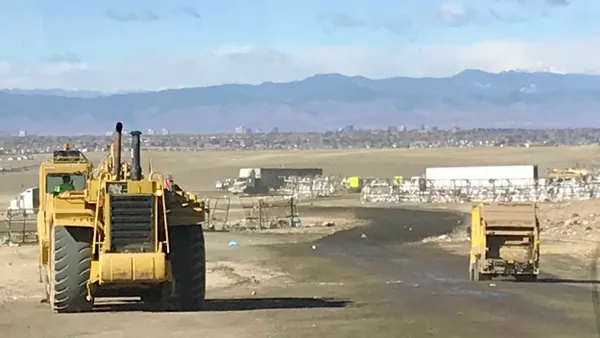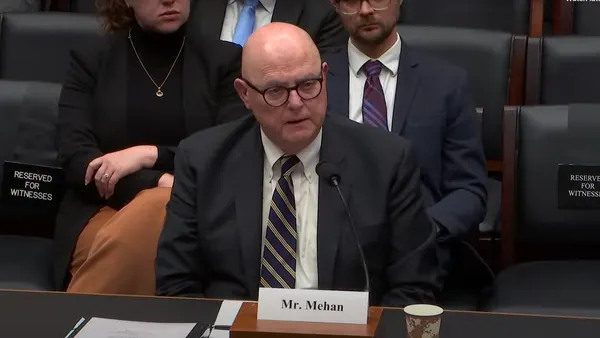UPDATE: Oct. 25, 2020: The U.S. EPA scored a victory in its protracted fight over promulgating a rule for landfill emissions. The Ninth Circuit Court of Appeals ruled in favor of the agency on Oct. 22 in the latest back-and-forth over the issue. The new decision reverses the U.S. District Court for the Northern District of California’s prior ruling denying a "motion to modify an injunction which required [EPA] to promulgate its federal landfill emissions plan by November 6, 2019."
The ruling finds the EPA's new 2021 deadline amounts to a change in the law, which nullifies the basis for the other court's decision mandating the agency issue a plan by 2019. The decision from the three-judge court was unanimous and it is unclear how opponents of the agency's delay may respond.
Dive Brief:
- November 2019: The U.S. District Court for the Northern District of California on Tuesday denied a request from the Environmental Protection Agency (EPA) seeking to shift its timeline for implementing a 2016 rule targeting landfill emissions. The decision is a victory for attorneys general from eight states, as well as the Environmental Defense Fund (EDF), which pushed back on the EPA's request in September.
- Judge Haywood Gilliam wrote in a six-page decision that the EPA's request for a delay is an effort to "sidestep" a previous court order from May. That order ruled the EPA had failed to meet its "nondiscretionary duties" under the Clean Air Act and required the agency to finalize an implementation plan for the 2016 Emissions Guidelines (EG) rule by Nov. 6.
- The ruling stays the judgment for 60 days to allow either party to appeal. EDF attorney Rachel Fullmer told Waste Dive that the ruling is "significant" and sets a "high bar" if the EPA wants to continue its fight against implementation. The agency is expected to still be working on its plans given the ruling, with chances of a delay looking less and less feasible.
Dive Insight:
Tuesday's ruling marks the latest turn in one of the most contentious battles for the industry at the federal level. Landfills are a leading source of methane emissions and a significant contributor to global warming, according to the U.N. Intergovernmental Panel on Climate Change. The EG rule applies to any MSW landfills that have accepted waste since Nov. 8, 1987, and the New Source Performance Standards (NSPS) rule apply to any that began construction since July 17, 2014. Both rules collectively affect almost 2,000 sites nationally.
Major players in the industry initially sought to challenge those regulations, including the National Waste and Recycling Association, Solid Waste Association of North America, Waste Management and Republic Services. The Trump administration has sided with the industry, and former EPA Administrator Scott Pruitt initially granted a 90-day stay in May 2017. The EPA later confirmed to Waste Dive in October 2017 it would not sanction states that did not submit EG plans. Arizona, California, Delaware, New Mexico, and West Virginia have all submitted EG compliance plans, while other states are stuck in limbo and unsure of whether to submit their own.
But the Trump administration has met with repeated resistance from the courts over the stalling effort. California, Pennsylvania, Illinois, Maryland, New Mexico, Oregon, Rhode Island, and Vermont took legal action in 2018 challenging the EPA, with support from EDF. That lawsuit led to the May ruling requiring the agency to promulgate a federal plan by Nov. 6, even as federal attorneys asked for a revised deadline of Aug. 30, 2021.
The Tuesday decision denies EPA's request for relief from the November deadline, but does throw the agency a lifeline with the 60-day stay. If no notice is filed, the stay will lift on Jan. 7, 2020.
Fullmer, the EDF attorney, indicated that the decision marks an important moment in the fight, all but ensuring that the May ruling will take effect. "Any further delay is just completely unwarranted," she said.
Litigation over the issue is likely to continue nonetheless, to the consternation of the industry. Despite resistance to the regulations, waste industry leaders also see the back-and-forth as counterproductive. At this year's WASTECON in Phoenix, multiple landfill operators and other industry professionals complained the regulatory fights have left them confused. Niki Wuestenberg, air compliance manager for Republic, told one concerned crowd of industry leaders that mixed messages over landfill regulations have required "a lot of wait and see" and left many in the waste space "without a path forward right now."








